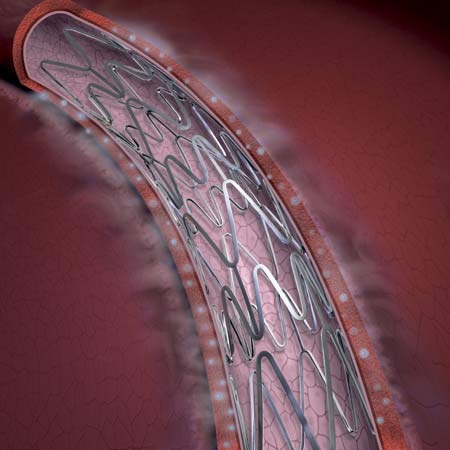Drug-eluting stents safer and superior to bare metal stents
 Washington, Mar 29 : Drug-eluting stents are much safer and superior to bare metal stents in preventing death and heart attacks among cardiac patients, according to researchers from Duke University Medical Center.
Washington, Mar 29 : Drug-eluting stents are much safer and superior to bare metal stents in preventing death and heart attacks among cardiac patients, according to researchers from Duke University Medical Center.
For their study, the researchers tested drug-eluting stents among 262,700 "real-world" patients enrolled in a nationwide registry of cardiovascular disease.
The study is the largest of its kind to date, and may finally put an end to years of controversy over the safety of the devices.
"We hope these findings will finally lay to rest any doubt about the safety of drug-eluting stents. Our results clearly show that drug-eluting stents are indeed safe," said Pamela Douglas, M. D., a cardiologist and member of the Duke Heart Center at Duke University Medical Center and the lead author of the study.
Stents are small tubes that can prop open blocked coronary arteries.
Although earlier versions were made of bare metal mesh, later models could release a medication that could suppress restenosis, or the growth of new tissue that could cause the artery to clog up again.
While drug-eluting stents were initially proven more effective, they later suffered a setback because studies linked them to higher long-term death rates. Thus, physicians have been debating the merit of bare and drug-eluting stents for a long time now.
During the new study, the researchers followed patients over age 65 enrolled in the National Cardiovascular Data Registry who had received stents from 2004 through
2006.
Most of the patients had received a drug-eluting stent; only 17 percent were implanted with the bare metal variety.
Then, the researchers matched the patients'' data with their Medicare claims and followed them for two and one-half years, measuring rates of death, heart attack, stroke, bleeding and the need for additional artery-opening procedures.
It was found that over the 30-month period, patients in the drug-eluting stent group had a 25 percent reduction in death and 24 percent reduction in heart attacks, as compared with those who received bare metal stents.
But they saw no significant difference in the incidence of stroke, major bleeding, or need for additional artery-opening procedures.
"First, the data show that over a two and one-half year follow up, drug-eluting stents are safe among patients in a real-world, highly variable environment. Patients who enroll in clinical trials are generally younger, healthier and on fewer medications that the population at large, and that means that clinical trials can generate findings that may not hold up in larger, more variable, community populations," said Douglas.
He added: "In addition, we believe this is the first time that anyone has been able to link so much clinical data with Medicare claims. What that essentially has given us is an excellent model for future post-marketing evaluation.
The findings appear online in the Journal of the American College of Cardiology. (ANI)